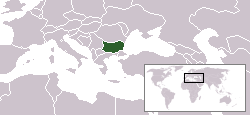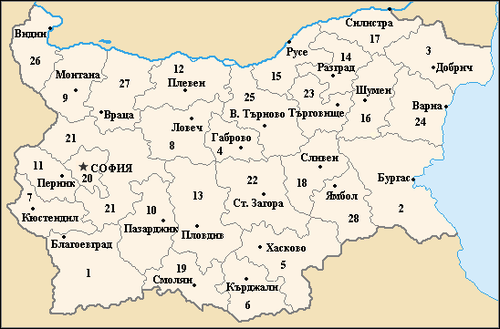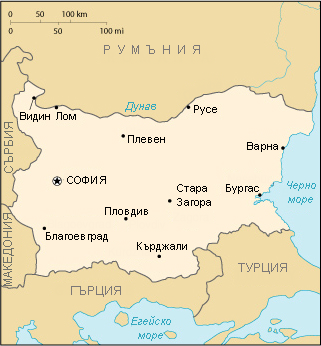Bulgaria
|
|
The Republic of Bulgaria is a republic in the southeast of Europe. It borders the Black Sea to the east, Greece and Turkey to the south, Serbia and Montenegro and the Republic of Macedonia to the west, and Romania to the north along the river Danube.
| |||||
| National motto: Съединението прави силата (Bulgarian: Union provides strength) | |||||

| |||||
| Official Language | Bulgarian | ||||
| Capital | Sofia | ||||
| President | Georgi Parvanov (BSP) | ||||
| Prime Minister | Simeon Saxe-Coburg Gotha (NMS2) | ||||
| Area - Total - % water | Ranked 102nd 111,001.9 km² 0.3% | ||||
| Population | Ranked 88th
7,537,929
| ||||
| Independence
- Gained autonomy - Declared | From the Ottoman Empire | ||||
| Currency | Lev | ||||
| Time Zone - in summer | EET (UTC+2) EEST (UTC+3) | ||||
| National Anthem | Mila Rodino | ||||
| Internet TLD | .bg | ||||
| Calling Code | +359 | ||||
| Contents |
History
Main article: History of Bulgaria
In the late 7th century a branch of the Bulgars led by Khan Asparuh migrated into the northern Balkans, where they merged with the local Slavic and Thracian population to form the first Bulgarian state in 681 AD. Bulgaria was a significant European power in the 9th and the 10th century, while fighting with the Byzantine Empire for the control of the Balkans. The Bulgarian state was crushed by an assault by the Rus in 969 and completely subdued by a determined Byzantine assault under Basil II in 1018.
It was re-established in 1185 and continued to be an important power in the European south-east for two more centuries, while fighting to assert its place in the region with the Byzantine Empire, the Crusader states in Greece, as well as Hungary. By the end of the 14th century the country was overrun by the Ottoman Empire.
An autonomous Bulgarian principality comprising Moesia and the region of Sofia was established in 1878 following the Russo-Turkish War, 1877-78. After uniting with Eastern Rumelia in 1885, the principality was proclaimed a fully independent kingdom in 1908.
During 1912 and 1913 it became involved in the Balkan Wars, a series of conflicts with its neighbours, during which Bulgarian territory varied in size. During World War I and later World War II, Bulgaria found itself fighting on the losing side. Despite that fact, Bulgaria saved the lives of its own 50,000 Jews from the Nazi death camps by refusing to comply with a 31 August 1943 resolution, which demanded their deportation to Auschwitz.
Bulgaria fell within the Soviet sphere of influence after World War II and became a People's Republic in 1946. Communist domination ended in 1990, when Bulgaria again held multiparty elections.
Bulgaria joined NATO on 29 March, 2004 and is set to join the European Union on 1 January, 2007 after signing the accession treaty on 25 April 2005.
Politics
Main article: Politics of Bulgaria
The president of Bulgaria is directly elected for a 5-year term with the right to one re-election. The president serves as the head of state and commander in chief of the armed forces. The president is the head of the Consultative Council for National Security and while unable to initiate legislation, the President can return a bill for further debate, though parliament can overturn the president's veto with a simple majority vote.
The Bulgarian unicameral parliament, the National Assembly or Narodno Sabranie, consists of 240 deputies who are elected for 4-year-term stretches by popular vote. The votes are for party or coalition lists of candidates for each of the twenty-eight administrative divisions. A party or coalition must garner a minimum of 4% of the vote in order to enter parliament. Parliament is responsible for enactment of laws, approval of the budget, scheduling of presidential elections, selection and dismissal of the prime minister and other ministers, declaration of war, deployment of troops outside of Bulgaria, and ratification of international treaties and agreements..
Regions
Main article: Regions of Bulgaria
Since 1999 Bulgaria consists of 28 regions (oblasti, singular - oblast), after having been subdivided into 9 provinces since 1987. All are named after the regional capital, with the national capital itself forming a separate region:
- Blagoevgrad
- Burgas
- Dobrich
- Gabrovo
- Haskovo
- Kardzhali
- Kyustendil
- Lovech
- Montana
- Pazardzhik
- Pernik
- Pleven
- Plovdiv
- Razgrad
- Ruse
- Shumen
- Silistra
- Sliven
- Smolyan
- Sofia
- Sofia Region
- Stara Zagora
- Targovishte
- Varna
- Veliko Tarnovo
- Vidin
- Vratsa
- Yambol
Geography
Main article: Geography of Bulgaria
Bulgaria is comprised of the classical regions of Thrace, Moesia and Macedonia. The southwest of the country is mountainous, containing the highest point of the Balkan Peninsula, peak Musala at 2,925 m, and the range of the Balkan mountains runs west-east through the middle of the country, north of the famous Rose Valley. Hill country and plains are found in the southeast, along the Black Sea coast in the east, and along Bulgaria's main river, the Danube in the north. Other major rivers include the Struma and the Maritsa river in the south.
The Bulgarian climate is temperate, with cold, damp winters and hot, dry summers.
The Balkan peninsula derives its name from the Balkan or Stara Planina mountain range which runs through the center of Bulgaria into eastern Serbia.
See also:
Economy
Main article: Economy of Bulgaria
Bulgaria's economy contracted dramatically after 1989 with the loss of the market of the Council for Mutual Economic Assistance (COMECON) member states, to which the Bulgarian economy had been closely tied. The standard of living fell by about 40%, but it regained pre-1990 levels in June 2004. In addition, UN sanctions against Yugoslavia and Iraq took a heavy toll on the Bulgarian economy. The first signs of recovery emerged in 1994 when the GDP grew and inflation fell. During 1996, however, the economy collapsed due to lack of international economic support and an unstable banking system. Since 1997 the country has been on the path to recovery, with GDP growing at a 4-5% rate, increasing FDI, macroeconomic stability and EU membership set for 2007.
The current government, elected in 2001, has pledged to maintain the fundamental economic policy objectives adopted by its predecessor in 1997, i.e., retaining the Currency Board, practicing sound financial policies, accelerating privatisation, and pursuing structural reforms. Economic forecasts for 2005 and 2006 predict continued growth in the Bulgarian economy. For 2005 and 2006 the real GDP growth (yoy, in %) is expected to be 5,3% and 6,0% respectively. Industrial output(expected - yoy, in %) for 2005 - 11,9% and for 2006 - 15,2%. Unemployment for 2005 - 11,5% and for 2006 - under 10%.
On April 25th, 2005 Bulgaria signed an accession treaty with the European Union and is set to join the bloc in 2007.
Demographics
Main article: Demographics of Bulgaria
According to the 2001 census, Bulgaria's population is mainly ethnic Bulgarian (83.9%), with two sizable minorities in the form of Turks (9.4%) and Roma (4.7%). Of the remaining 2.0%, 0.9% are distributed among some forty smaller minorities, the most numerous of which are the Armenians, Russians, Vlachs,Tatars, Karakachans, Macedonian Slavs and Jews; the people who have not declared their ethnicity are 1.1% of the total population. 84.8% of the Bulgarian population speak Bulgarian, a member of the Slavic languages, as mother-language. Bulgarian is the only official language, but other languages are spoken, corresponding closely to ethnic breakdown.
Most Bulgarians (82.6%) are at least nominally a member of the Bulgarian Orthodox Church, the national Eastern Orthodox church. Other religious denominations include Islam (12.2%), Roman Catholicism (0.6%), various Protestant denominations (0.5%), with other denominations, atheists and undeclared numbering ca. 4.1%.
Culture
Main article: Culture of Bulgaria
Religion
Most citizens of Bulgaria are at least nominally members of the Bulgarian Orthodox Church founded in 870 AD (autocephalous since 927). The Bulgarian Orthodox Church is the independent national church of Bulgaria like the other national branches of Eastern Orthodoxy and is considered an inseparable element of Bulgarian national consciousness. The church has been abolished, or rather reduced to a subordinate position within the Greek Orthodox Church, twice during the periods of Byzantine (1018-1185) and Ottoman (1396-1878) domination but has been revived every time as a symbol of Bulgarian statehood. In 2001, the Bulgarian Orthodox Church had a total of 6,552,000 members in Bulgaria (82.6% of the population). However many younger people raised during the 45 years of communist rule are not religious even though they formally may be members of the church.
Nevski1.jpg
Despite the dominant position of the Bulgarian Orthodox Church in Bulgarian cultural life, a number of Bulgarian citizens belong to other religious denominations, most notably Islam, Roman Catholicism and Protestantism. Islam came to Bulgaria at the end of the 14th century after the conquest of the country by the Ottomans. It gradually gained ascendancy throughout the 15th and 16th century by introduction of Turkish colonists and (usually forceful) conversion of Bulgarians and at the time of the Liberation (1878) not less than 40% of the population of the country was Muslim. The percentage has been greatly reduced since then, mostly due to emigration. In 2001, there were 967,000 Muslims in Bulgaria (12.2% of the population).
In the 16th and the 17th century missionaries from the Vatican converted the Bulgarian Paulicians in the districts of Plovdiv and Svishtov to Roman Catholicism. Their descendants form nowadays the bulk of Bulgarian Catholics whose number stood at 44,000 in 2001. Protestantism was introduced in Bulgaria by missionaries from the United States in 1857. Missionary work continued throughout the second half of the 19th and the first half of the 20th century. In 2001, there were some 42,000 Protestants in Bulgaria.
- Bulgarian Orthodox Church
- Roman Catholicism in Bulgaria
- Protestantism in Bulgaria
- Islam in Bulgaria
- Judaism
National parks
Bulgaria has over 10 major national parks and many reservation areas.
- Rila National Park (http://www.rilanationalpark.org/en/)
- Central Balkan National Park (http://www.centralbalkannationalpark.org/en/)
- Stara Planina (Balkan Mountains) (http://www.staraplanina.org/index.php)
- Pirin National Park (http://www.pirin-np.com/English/pirin-np_E.htm)
- Bulgarian National Parks (http://www.bulgariannationalparks.org/en/)
- Green Balkans (http://www.greenbalkans.org/index_en.html)
Miscellaneous topics
- Communications in Bulgaria
- Transportation in Bulgaria
- Military of Bulgaria
- Foreign relations of Bulgaria
- Tourism in Bulgaria
- Public holidays in Bulgaria
- Reporters without borders world-wide press freedom index 2004: ranked 36 out of 167 countries
Much of the material in these articles comes from the CIA World Factbook 2000 and the 2003 U.S. Department of State website.
External links
Official
- Council of Ministers (http://www.government.bg/English) - Official Governmental Site
- European Youth Parliament - Bulgaria (http://www.eypbulgaria.org/)
- President.bg (http://www.president.bg/en/index.php) - Official Presidential Site
- Narodno Sabranie (http://www.parliament.bg/?lng=en) - Official Parliamentary Site
- Ministry of Finance of Bulgaria (http://www.minfin.government.bg/?language=english)
- Ministry of Interior of Bulgaria (http://www.mvr.bg/en/)
- Ministry of Transport and Communications of Bulgaria (http://www.mtc.government.bg/indexe.htm)
- Ministry of Culture and Tourism of Bulgaria (http://www.culture.government.bg/index.html?l=en)
- Ministry of Economy of Bulgaria (http://www.mi.government.bg/eng/)
- Ministry of Energy and Energy Resources of Bulgaria (http://www.doe.bg/cgi-bin/i.pl?l=2)
- Ministry of Enviroment and Water of Bulgaria (http://www2.moew.government.bg/index_e.html)
- Ministry of Foreign Affairs of Bulgaria (http://www.mfa.government.bg/index_en.html)
- Ministry of Defense of Bulgaria (http://www.mod.bg/_en_/)
- National Radio (http://www.bnr.bg/RadioBulgaria/Emission_English/) - Official Radio Site
Other
- Art, history and music of Bulgaria (http://www.kirildouhalov.net)
- Pictures of Bulgaria (http://www.pbase.com/ngruev/bulgaria/)
- Map, Info and Pictures of Bulgaria and Cities (http://www.greatestcities.com/Europe/Bulgaria.html)
- Historical maps of Bulgaria (http://www.balcanica.org/history/maps.html)
- Picture Gallery of Bulgaria (http://www.blackseaestates.net/DesktopDefault.aspx?tabindex=5&tabid=12,)
| European Union (EU) and candidates for enlargement | Missing image European_flag.png Flag of the European Union |
|---|---|
|
Member countries: Austria | Belgium | Cyprus | Czech Republic | Denmark | Estonia | Finland | France | Germany | Greece | Hungary | Ireland | Italy | Latvia | Lithuania | Luxembourg | Malta | Netherlands | Poland | Portugal | Slovakia | Slovenia | Spain | Sweden | United Kingdom | |
|
Acceding countries joining on January 1, 2007: Bulgaria | Romania | |
| Countries in Europe |
|---|
| Albania | Andorra | Austria | Azerbaijan1 | Belarus | Belgium | Bosnia and Herzegovina | Bulgaria | Croatia | Cyprus2 | Czech Republic | Denmark | Estonia | Finland | France | Germany | Greece | Hungary | Iceland | Ireland | Italy | Latvia | Liechtenstein | Lithuania | Luxembourg | Macedonia | Malta | Moldova | Monaco | Netherlands | Norway | Poland | Portugal | Romania | Russia1 | San Marino | Serbia and Montenegro | Slovakia | Slovenia | Spain | Sweden | Switzerland | Turkey1 | Ukraine | United Kingdom | Vatican City |
| Dependencies: Akrotiri and Dhekelia2 | Faroe Islands | Gibraltar | Guernsey | Jan Mayen | Jersey | Isle of Man | Svalbard |
| 1. Country partly in Asia. 2. Usually assigned to Asia geographically, but often considered European for cultural and historical reasons. |
Volga Bulgaria is also a historic state that existed in 10-14th centuries around the confluence of Volga and Kama.ar:بلغاريا roa-rup:Bulgarii ast:Bulgaria bg:България bn:বুলগেরিয়া bs:Bugarska ca:Bulgària cs:Bulharsko cy:Bwlgaria da:Bulgarien de:Bulgarien et:Bulgaaria el:Βουλγαρία es:Bulgaria eo:Bulgario fa:بلغارستان fr:Bulgarie fy:Bulgarije gd:Bulgàiria gl:Bulgaria - България ko:불가리아 hi:बुल्गारिया io:Bulgaria id:Bulgaria ia:Bulgaria is:Búlgaría it:Bulgaria he:בולגריה la:Bulgaria lv:Bulgārija lt:Bulgarija li:Bölgarieë hu:Bulgária mk:Бугарија mt:Bulgarija ms:Bulgaria zh-min-nan:Bulgariya nl:Bulgarije nds:Bulgarien ja:ブルガリア nb:Bulgaria nn:Bulgaria oc:Bulgaria pl:Bułgaria pt:Bulgária ro:Bulgaria ru:Болгария sa:बुल्गारिया scn:Bulgaria sk:Bulharsko sl:Bolgarija sr:Бугарска fi:Bulgaria sv:Bulgarien th:ประเทศบัลแกเรีย tr:Bulgaristan uk:Болгарія wa:Bulgåreye yi:בולגאַריע zh:保加利亚




